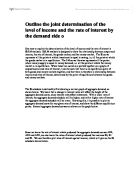Debates on whether these countries will fall into the middle-income trap
The rapid development of "BRIC" becomes a hot topic and inspires debate among scholars on whether these countries will stop and fall into the middle-income trap. From a general perspective, the scholars' opinions can be classified into two main kinds: some scholars such as Barry et al(2011), Yusuf and Nabeshima (2009),insist that these countries will slow down eventually in the near future and once they begin to slow down, the middle-income trap is unavoidable; while the others, such as Paus(2012),Ohno(2011) and Felipe et al.(2012) ,argues that these developing countries are dealing with problems positively and some successful countries which cross the trap provide precious and useful experience.
Negative scholars who hold the idea that the real question is not whether they will slow down, it is when they will slow down and drop into the trap have several reasons.
First, analyzing the date of these countries shows that these countries, especially China, are slowing down in the recent years.( Barry et al 2011)
Second, the problem exposed during development such as higher old-age dependency ratios in China, the inflation, the distribution of income is hard to solve. (http://www.economist.com/node/18560195, 2011)
Finally, according to Yusuf and Nabeshima (2009) it is not easy to take-off and become a middle-income country; but catching up with the high-income countries is even harder. Some countries, like Malaysia, had become a high-income countries once. After a while, they turned back and stayed in the middle-income trap for many years.
But some scholars oppose the opinions above by presenting different reasons.
First, according to the calculation by Paus (2012), China will become a high-income country in 2015.
Second, some countries in Asia, have successfully jumped the trap. They are good role models. (Ohno 2011)
Finally, in fact, the middle-income trap is caused by product trap, and the problems can be solved with efficient policies. (Felipe et el 2012)
The author's opinion
After reexamining the reasons on both sides, I positively hold the point that the trap can be avoided through hard work.
First, the growth in these developing countries can be sustained as the positive scholars' calculation seems to be more credible.
Second, the hard work of the governments should be noted. And the changes that took place in the political, economic and social spheres show some signs of getting better.
Finally, some cases that countries staying in the trap for years don't mean "BRIC" will follow the old road since they have entirely different ways in growth.
Conclusion
In conclusion, predicting the future with great accuracy is difficult. Whether these countries will drop into the trap or not is not certain. There are reasons to worry about these countries as the possible inflation prevailing in the developed countries will also affect these new emerging markets. Another significant challenge is technology.
However, it is too early to be pessimistic about the "BRIC". These countries still have a chance to cross the trap through implementing some positive policies. The market failure can be corrected by the government.
Reference:
Eichengreen,B. et al.(2011) “Fast growing economies slow down: international evidence and implications for china.” NBER Working Paper no. 16919.
Felipe,J. et al.(2012) “Tracking the Middle-income Trap: What Is It, Who Is in It, and Why?” Levy Economics Institute, Working Paper no. 715.
http://www.economist.com/node/18560195. (2011)(Accessed by 14 Apr 2011)
Malinen,T.(2012)“Estimating the long-run relationship between income inequality and economic development” Empirical Economics 42(1), pp.209-233
Ohno,K.(2011) “Avoiding the Middle-Income Trap, Renovating Industrial Policy Formulation in Vietnam” Asian Economic Bulletin 26(1),pp. 25–43
Paus,E.(2012)“Confronting the Middle Income Trap: Insights from Small Latecomers” Studies in Comparative International Development 47(2),pp.115 –138
Yusuf,S &Nabeshima,K (2009)“Can Malaysia Escape the Middle-Income Trap? A Strategy for Penang” The World Bank Development Research Group, Policy Research Working Paper No.4971
总体意见:
(1)是否切题:根据作者介绍的文章结构看,作者是切题的。
(2)是否选用了恰当的理论框架:每个作业,都应该从学生所学的内容中选择理论框架来解决研究问题。学生所学的内容体现在module handbook或者讲义等资料中。从论文结构来看,理论框架是不符合要求的。文中没有标注足够的reference。比如some scholars是指who?至少要标注2到3个reference。
(3)是否收集和分析了恰当的数据或者证据:有看到作者在前述理论框架的指导下收集数据。
(4)是否规范:不够规范。第一,文后的文献格式错误;文献在文中的标注格式错误。请仔细看cite them right文档并修改文献格式。
(5)语言尚可。
(6)原创不知道,没有经过抄袭检测,无法判断。若有抄袭别人原句的情况,则肯定挂掉。
Bright, M. (2003) ‘The advance of learning’, Journal of Ideas,
42(2), pp. 259–77, E-learning in higher education [Online]. Available at: http://elearning.northumbria.ac.uk (Accessed:
23 July 2003).








